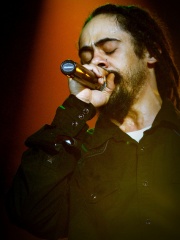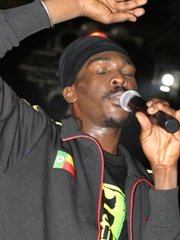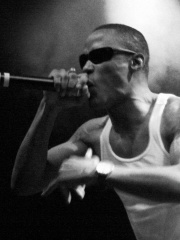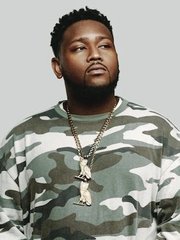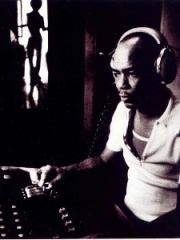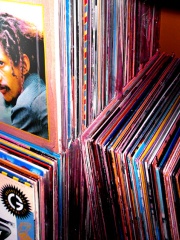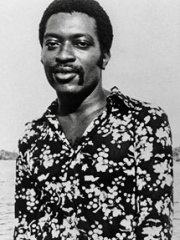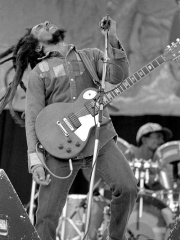
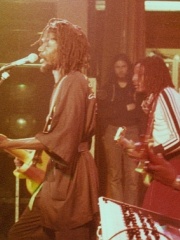
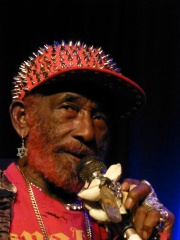
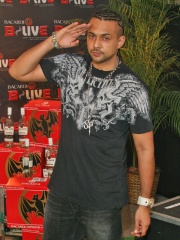
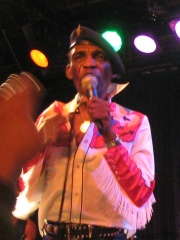
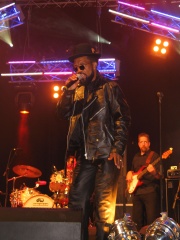
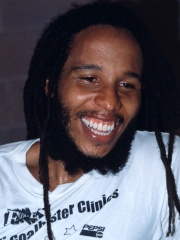
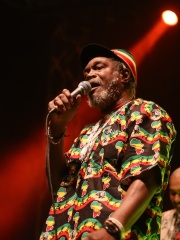
The Most Famous
MUSICIANS from Jamaica
Top 10
The following people are considered by Pantheon to be the top 10 most legendary Jamaican Musicians of all time. This list of famous Jamaican Musicians is sorted by HPI (Historical Popularity Index), a metric that aggregates information on a biography's online popularity. Visit the rankings page to view the entire list of Jamaican Musicians.

1. Bob Marley (1945 - 1981)
With an HPI of 87.58, Bob Marley is the most famous Jamaican Musician. His biography has been translated into 132 different languages on wikipedia.
Robert Nesta Marley (6 February 1945 – 11 May 1981) was a Jamaican singer, songwriter, and guitarist. Considered one of the pioneers of reggae, he fused elements of reggae, ska, and rocksteady, and was renowned for his distinctive vocal and songwriting style. Marley increased the visibility of Jamaican music worldwide and became a global figure in popular culture. He became known as a Rastafarian icon, and he infused his music with a sense of spirituality. Marley is also considered a global symbol of Jamaican music, culture and identity and was controversial in his outspoken support for democratic social reforms. Marley also supported the legalisation of cannabis and advocated for pan-Africanism. Born in Nine Mile, Jamaica, Marley began his career in 1963, after forming the group Teenagers with Peter Tosh and Bunny Wailer, which became the Wailers. In 1965, they released their debut studio album, The Wailing Wailers, which included the single "One Love", a reworking of "People Get Ready". It was popular worldwide and established the group as a rising figure in reggae. The Wailers released 11 more studio albums, and after signing to Island Records, changed their name to Bob Marley and the Wailers. While initially employing louder instrumentation and singing, they began engaging in rhythmic-based song construction in the late 1960s and early 1970s, which coincided with Marley's conversion to Rastafari. Around this time, Marley relocated to London, and the group embodied their musical shift with the release of the album The Best of The Wailers (1971). Bob Marley and the Wailers began to gain international attention after signing to Island and touring in support of the albums Catch a Fire and Burnin' (both 1973). Following their disbandment a year later, Marley carried on under the band's name. The album Natty Dread (1974) received positive reviews. In 1975, following the global popularity of Eric Clapton's version of Marley's "I Shot the Sheriff", Marley had his international breakthrough with his first hit outside Jamaica, a live version of "No Woman, No Cry", from the Live! album. This was followed by his breakthrough album in the United States, Rastaman Vibration (1976), which reached the Top 50 of the Billboard Soul Charts. A few months later, Marley survived an assassination attempt at his home in Jamaica, which was believed to be politically motivated. He permanently relocated to London, where he recorded the album Exodus, which incorporated elements of blues, soul, and British rock and had commercial and critical success. In 1977, Marley was diagnosed with acral lentiginous melanoma; he died in May 1981, shortly after baptism into the Ethiopian Orthodox Church. Fans around the world expressed their grief, and he received a state funeral in Jamaica. The greatest hits album Legend was released in 1984 and became the best-selling reggae album of all time. Marley also ranks as one of the best-selling music artists of all time, with estimated sales of more than 75 million records worldwide. In February 1981, three months before his death, Marley was honoured with a designated Order of Merit, Jamaica's highest honor related to people involved with either the arts, literature or science. In 1994, Marley was posthumously inducted into the Rock and Roll Hall of Fame. Rolling Stone ranked him No. 11 on its list of the 100 Greatest Artists of All Time, and No. 98 on its list of the 200 Greatest Singers of All Time. His other achievements include a Grammy Lifetime Achievement Award, a star on the Hollywood Walk of Fame, and induction into the Black Music & Entertainment Walk of Fame.

2. Peter Tosh (1944 - 1987)
With an HPI of 66.71, Peter Tosh is the 2nd most famous Jamaican Musician. His biography has been translated into 43 different languages.
Winston Hubert McIntosh (19 October 1944 – 11 September 1987), known professionally as Peter Tosh, was a Jamaican musician and reggae singer. Along with Bob Marley and Bunny Wailer, he was one of the core members of the band the Wailers (1963–1976), after which he established himself as a successful solo artist and a promoter of Rastafari. He was murdered in 1987 during a home invasion.

3. Lee "Scratch" Perry (1936 - 2021)
With an HPI of 61.37, Lee "Scratch" Perry is the 3rd most famous Jamaican Musician. His biography has been translated into 31 different languages.
Lee "Scratch" Perry (born Rainford Hugh Perry; 20 March 1936 – 29 August 2021) was a Jamaican record producer, songwriter and singer noted for his innovative studio techniques and production style. Perry was a pioneer in the 1970s development of dub music with his early adoption of remixing and studio effects to create new instrumental or vocal versions of existing reggae tracks. He worked with and produced for a wide variety of artists, including Bob Marley and the Wailers, Junior Murvin, the Congos, Max Romeo, the Heptones, Adrian Sherwood, the Beastie Boys, Ari Up, the Clash, the Orb, and many others.

4. Sean Paul (b. 1973)
With an HPI of 58.60, Sean Paul is the 4th most famous Jamaican Musician. His biography has been translated into 54 different languages.
Sean Paul Ryan Francis Henriques (born 9 January 1973) is a Jamaican dancehall singer and rapper. His first album, Stage One, was released in 2000. He gained international fame with his second album, Dutty Rock, in 2002. Its single "Get Busy" topped the US Billboard Hot 100 chart in the United States, as did "Temperature", off his third album, The Trinity (2005). Paul frequently invokes the nickname "Chanderpaul", originating from the similarity between his first two names and cricketer Shivnarine Chanderpaul. In the Vice documentary The Story of 'Get Busy' by Sean Paul, when asked "How did you become 'Sean Da Paul'", Paul recalls how others would call him Chan-der-paul, and the name stuck. He then started saying it in shows and recordings. Most of his albums have been nominated for Grammy Awards for Best Reggae Album, with Dutty Rock winning the award. Paul has been featured in many other singles, including chart-toppers "Baby Boy" by Beyoncé, "Breathe" by Blu Cantrell, "What About Us" by The Saturdays, "Rockabye" by Clean Bandit, "Cheap Thrills" by Sia, and "Fuego" by DJ Snake. "Cheap Thrills" and "Rockabye", along with Paul's own "No Lie" (2016), each have over 1 billion views on YouTube, with "Rockabye" having reached over 2.7 billion views.
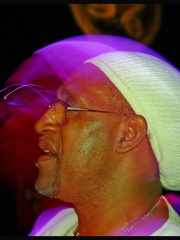
5. DJ Kool Herc (b. 1955)
With an HPI of 58.08, DJ Kool Herc is the 5th most famous Jamaican Musician. His biography has been translated into 26 different languages.
Clive Campbell (born April 16, 1955), better known by his stage name DJ Kool Herc, is a Jamaican-American DJ who is credited with being the founder of hip-hop music in the Bronx, New York City, in 1973. Nicknamed the Father of Hip-Hop, Campbell began playing hard funk records of the sort typified by James Brown. Campbell isolated the instrumental portion of the record which emphasized the drum beat—the "break"—and switch from one break to another. Using the same two-turntable set-up of disco DJs, he used two copies of the same record to elongate the break. This breakbeat DJing, using funky drum solos, formed the basis of hip hop music. Campbell's announcements and exhortations to dancers helped lead to the syncopated, rhythmically spoken accompaniment now known as rapping. He called the dancers "break-boys" and "break-girls", or simply b-boys and b-girls, terms that continue to be used fifty years later in the sport of breaking. Campbell's DJ style was quickly taken up by figures such as Afrika Bambaataa and Grandmaster Flash. Unlike them, he never made the move into commercially recorded hip hop in its earliest years. On November 3, 2023, Campbell was inducted into the Rock and Roll Hall of Fame in the Musical Influence Award category.

6. Desmond Dekker (1941 - 2006)
With an HPI of 57.95, Desmond Dekker is the 6th most famous Jamaican Musician. His biography has been translated into 31 different languages.
Desmond Dekker (born Desmond Adolphus Dacres; 16 July 1941 – 25 May 2006) was a Jamaican ska, rocksteady and reggae singer-songwriter and musician. Together with his backing group the Aces (consisting of Wilson James and Easton Barrington Howard), he had one of the earliest international reggae hits with "Israelites" (1968). Other hits include "007 (Shanty Town)" (1967), "It Mek" (1969) and "You Can Get It If You Really Want" (1970).

7. Prince Buster (1938 - 2016)
With an HPI of 56.67, Prince Buster is the 7th most famous Jamaican Musician. His biography has been translated into 25 different languages.
Cecil Bustamente Campbell (24 May 1938 – 8 September 2016), known professionally as Prince Buster, was a Jamaican singer-songwriter and producer. The records he released in the 1960s influenced and shaped the course of Jamaican contemporary music and created a legacy of work that would be drawn upon later by reggae and ska artists.

8. Ziggy Marley (b. 1968)
With an HPI of 56.51, Ziggy Marley is the 8th most famous Jamaican Musician. His biography has been translated into 27 different languages.
David Nesta "Ziggy" Marley (born 17 October 1968) is a Jamaican reggae musician, songwriter, producer, author and philanthropist. The eldest son of Bob Marley and Rita Marley, he led the family band Ziggy Marley and the Melody Makers until 2002, releasing eight studio albums, before launching a solo career on his label Tuff Gong Worldwide. He has won eight Grammy Awards and a Daytime Emmy Award. Beyond recording and touring, Marley is active in philanthropy through the U.R.G.E. (Unlimited Resources Giving Enlightenment) Foundation, which supports education, health and environmental projects for children in Jamaica, Africa and North America. In 2024 he served as a producer of the biographical film Bob Marley: One Love; the companion compilation Bob Marley: One Love – Music Inspired By The Film (Deluxe) won the 2025 Grammy Award for Best Reggae Album. His recent projects include the children's picture book Pajammin' (June 24, 2025), and a North American "Do The Reggae" co-headlining tour with Burning Spear in fall 2025. Marley also reunited with his brothers for the Marley Brothers' Legacy Tour in 2024, the siblings' first collective tour in two decades, performing their father's catalog in major U.S. cities.

9. Horace Andy (b. 1951)
With an HPI of 55.57, Horace Andy is the 9th most famous Jamaican Musician. His biography has been translated into 22 different languages.
Horace Andy (born Horace Keith Hinds, 19 February 1951) is a Jamaican roots reggae songwriter and singer, known for his distinctive vocals and hit songs such as "Skylarking", as well as "Government Land", "Angel", "Spying Glass", and "Five Man Army" with English trip hop group Massive Attack. He is also famous for a cover version of "Ain't No Sunshine". Andy is often described as one of the most respected and influential singers in Jamaica.
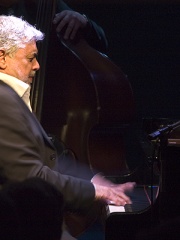
10. Monty Alexander (b. 1944)
With an HPI of 55.45, Monty Alexander is the 10th most famous Jamaican Musician. His biography has been translated into 19 different languages.
Montgomery Bernard "Monty" Alexander OJ CD (born 6 June 1944) is a Jamaican American jazz pianist. His playing has a Caribbean influence and bright swinging feeling, with a strong vocabulary of bebop jazz and blues rooted melodies. He was influenced by Louis Armstrong, Duke Ellington, Erroll Garner, Nat King Cole, Oscar Peterson, Ahmad Jamal, Les McCann, and Frank Sinatra. Alexander also sings and plays the melodica. He is known for his surprising musical twists, bright rhythmic sense, and intense dramatic musical climaxes. His recording career has covered many of the well-known American songbook standards, jazz standards, pop hits, and Jamaican songs from his original homeland. Alexander has resided in New York City for many years and performs frequently throughout the world at jazz festivals and clubs.
People
Pantheon has 20 people classified as Jamaican musicians born between 1936 and 1986. Of these 20, 11 (55.00%) of them are still alive today. The most famous living Jamaican musicians include Sean Paul, DJ Kool Herc, and Ziggy Marley. The most famous deceased Jamaican musicians include Bob Marley, Peter Tosh, and Lee "Scratch" Perry. As of April 2024, 2 new Jamaican musicians have been added to Pantheon including Anthony B, and Boi-1da.
Living Jamaican Musicians
Go to all RankingsSean Paul
1973 - Present
HPI: 58.60
DJ Kool Herc
1955 - Present
HPI: 58.08
Ziggy Marley
1968 - Present
HPI: 56.51
Horace Andy
1951 - Present
HPI: 55.57
Monty Alexander
1944 - Present
HPI: 55.45
Damian Marley
1978 - Present
HPI: 55.29
Diana King
1970 - Present
HPI: 46.82
Vybz Kartel
1976 - Present
HPI: 42.62
Anthony B
1976 - Present
HPI: 41.10
Canibus
1974 - Present
HPI: 36.09
Boi-1da
1986 - Present
HPI: 28.89
Deceased Jamaican Musicians
Go to all RankingsBob Marley
1945 - 1981
HPI: 87.58
Peter Tosh
1944 - 1987
HPI: 66.71
Lee "Scratch" Perry
1936 - 2021
HPI: 61.37
Desmond Dekker
1941 - 2006
HPI: 57.95
Prince Buster
1938 - 2016
HPI: 56.67
King Tubby
1941 - 1989
HPI: 54.78
Augustus Pablo
1954 - 1999
HPI: 52.87
John Holt
1947 - 2014
HPI: 49.66
Junior Murvin
1949 - 2013
HPI: 47.76
Newly Added Jamaican Musicians (2025)
Go to all RankingsOverlapping Lives
Which Musicians were alive at the same time? This visualization shows the lifespans of the 9 most globally memorable Musicians since 1700.

